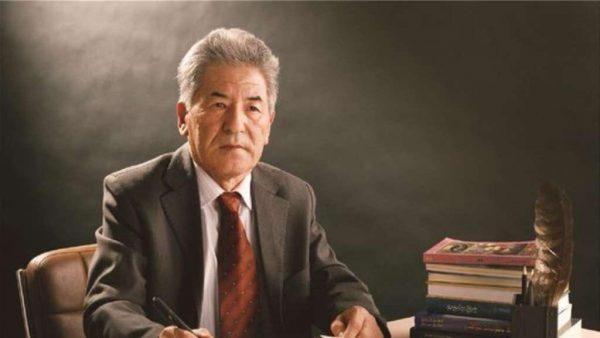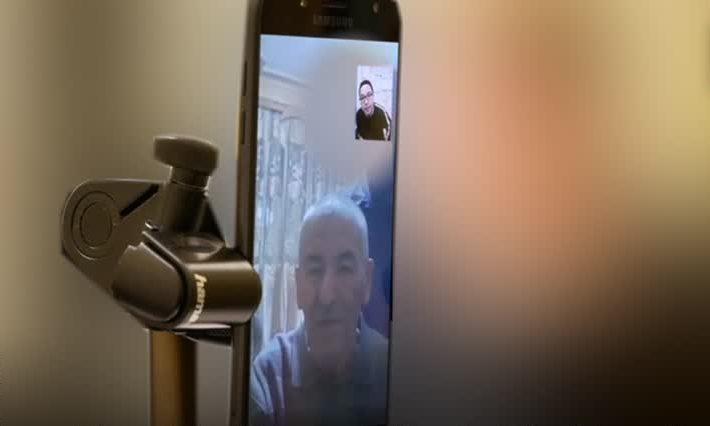Family members of Uyghurs who have been “disappeared"—most likely detained in China’s vast network of “vocational re-education centers”—have begun to receive “proof of life” video calls from their lost loved ones, The Epoch Times can reveal.
On March 1, Tahir Mutallip Qahiri, 38, was initially relieved when he received a video call via WeChat from his 69-year-old father, Mutallip Sidiq Qahiri—once a prominent Uyghur scholar and professor—who had suddenly disappeared from his home in Kashgar, Western Xinjiang, last September.
The pair had lost contact almost 12 months before his disappearance. Once Tahir learned that his father wasn’t at home, he began tirelessly campaigning and contacting Chinese authorities for information on his father’s whereabouts.
But when Mutallip started demanding that Tahir cease advocating for his freedom, Tahir realized that his father had most likely been threatened before he was allowed to call.
Tahir believes his father was forced by the Chinese Communist Party (CCP) to phone him in what appears to be a wider attempt to silence those who are speaking up about their detained or “disappeared” family members in Xinjiang.
Tahir had earlier learned through a contact in the police department that Mutallip was due to appear before the People’s Court in February after being accused of making propaganda for separatist activities against the state.
Given the widespread crackdown against Uyghur intellectuals and cultural leaders in the region, the family believes that Mutallip had been targeted for publishing 20 books on the Uyghur and Arabic language throughout the span of his career before he retired in 2010.
In video footage shown exclusively to The Epoch Times, Mutallip tells his son, who secretly taped their 47-minute conversation, to forget everything he had said about his well-being and for Tahir to thank the CCP. If not, Tahir would be disowned.
“My father said, ‘Look, I want you to write back to all those authorities telling them that everything is perfect’ ... that I made a mistake, that I had lied, or had heard lies about him, and to apologize for causing inconvenience,” Tahir told The Epoch Times in a phone interview from Germany.
“Looking at him physically, I could clearly tell that he went through some hardship. He was like skin to bone. He was really skinny and his head was shaved like a prisoner.”

When Tahir asked his father why he hadn’t contacted him in 17 months, Mutallip said his health had deteriorated.
“He said he didn’t want me to be worried or to hinder my studies. It was a pretty lame excuse basically,” Tahir explained.
Despite his worries, Tahir said that the “proof of life” call was a positive thing given that he hadn’t been able to talk to his father since October 2017.
Escalating Crackdown on Uyghur Intellectuals
At least 338 Uyghur intellectuals have been “interned, imprisoned, or forcibly disappeared” by the CCP since April 2017, a January report (PDF) by the Uyghur Human Rights Project (UHRP) found.“These people are leaders and offer a focal point for Uyghurs, and so to target them is really an effective way of accelerating assimilative processes but it is also a way of breaking Uyghur identity at the same time,” UHRP senior researcher Henryk Szadziewski told The Epoch Times.
Mutallip, who taught Turkic and Uyghur literature at Kashgar University between 1983-1991, is best known for his 900-page work titled An Onomasticon of the Modern Uighur language (2010), which is considered central to Uyghur Studies.
Beijing has carried out a “decades-long campaign to systematically eradicate Uyghur language from public life, which includes the denial of Uyghur language education in the regional curriculum,” the UHRP report details.
But mounting evidence suggests that detainees are being exploited as forced labor in the camps-turned-training centers. Former Uyghur detainees have told The Epoch Times that they were subject to torture, forced to denounce their faith, and forced to pledge loyalty to the CCP while held for unknown reasons in often overcrowded facilities.
Uyghur Diaspora On ‘High Alert’
Arslan Hidayat, son-in-law of the prominent Uyghur comedian Adil Mijit, who has been missing since November last year, told The Epoch Times that the Uyghur diaspora are now preparing themselves to receive more video calls from their loved ones.“Many people are receiving ‘proof of life’ video calls or videos, and it’s pretty much the same message, where family members are pledging allegiance to the CCP, saying how dare you go to the media and talk about the situation in Xinjiang. We don’t know you, we disown you,” he said in a phone interview from Istanbul.
“Everyone in the Uyghur diaspora are actually on high alert, because they could expect a video call at any time.
“I’ve told my brother-in-law [Adil Mijit’s son] to keep his cameras charged and ready to go, just in case we receive a similar call.”
Tahir believes the WeChat video call was Beijing attempting to silence his ongoing efforts advocating for his father’s freedom.
“What’s crazy is I have clear evidence that he could have been put to death for separatism and now suddenly, he’s back at home. I think the reason that they’re calling me is to reassure me so that I stop my advocation,” he said.





